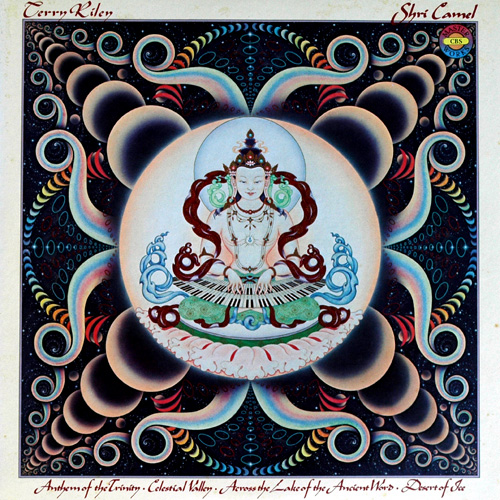7.

Terry Riley – Shri Camel
Yeah, obviously I like Terry Riley [laughs]. He’s my favourite of the minimalists, if I had to pick favourites. This piece Luke [Abbott] sent me an mp3 of, it was on UbuWeb, which was how I discovered it. I think it’s my favourite of his, just because of the cadence being so nice at the end. It’s like a Hindustani raga or something, the structure of it, and then the way it shifts every so often, it’s just beautiful. It’s in Just Intonation and I hadn’t noticed; where a lot of Just Intonation stuff sounds strange to your ears, this just sounds natural.
It’s interesting that [in minimalism] Terry had the idea, Terry was the original one, but somehow Steve [Reich] is accepted in the canon, the Proms. [Riley’s] work doesn’t really cater to the classical world. He doesn’t really produce products so much either – it’s not about scores that musicians can play in a concert hall, it’s about his all-night performance which is too long to put on a record. Which is sort of self-limiting; acceptance in the canon is, to some extent, down to some sort of capitalist engagement, otherwise you don’t get to that point. I think he’s avoided that, and made better works and bigger ideas as a result of that.
That’s not to do down Steve Reich. The first time I heard Music For Eighteen Musicians I got back in the car from Gatwick, ages ago, and it came on the radio, but I’d missed the announcement saying what it was. I just got in the car and started the engine, and the first thing I heard was this applause dying away, and then the hour-long drive home was that whole piece of music. To hear it and not know what it was, that was even more magical, I was completely in love with it. But then I discovered Terry afterward, and the procedural scores, like In C, are interesting, but it’s his touch when he plays that’s really awe-inspiring to me as a keyboard player as well.
In a way, this list is all the spiritual things I could put without just writing "Don Cherry, Pharaoh Sanders" again and again, thirteen times. I didn’t feel I could say anything particularly meaningful about those records so I left them off. But that’s a massive part of what I’m interested in, it’s almost everything. Music that changes you, or that hypnotises you, or that you can get lost in. But because of this accursed Western education, and maths and sciences, I’m coming at it – not cynically, but can an atheist make spiritual music? I don’t know. I’m interested in it as a beautiful emergent behaviour of the brain, something that’s quite wonderful to experience. Lots of the words in Don Cherry and Alice Coltrane’s records about ‘universal connectedness’ and stuff, I suppose I’m quite cynical about those ideas. [But] it’s very hard to be an atheist without becoming a bit Dawkins-y, trying to pin everything down to some sort of… Human experience is mystical, and your perception of the world is very filtered and limited, and the gaps in that leave lots of room for magical experiences.
Someone should pin Richard Dawkins down and force-feed him mushrooms. That’s the answer, really. That would solve everything. [His current crusade] is madness, really. His Twitter is like Zomby’s Twitter, except I only follow the parody Dawkins, and the real Zomby I find interesting and charming. Some of the things he says are so true and insightful and everyone should listen, and he’s right, but they’re in amongst so much noise that they’re lost. His best thoughts are ones which challenge orthodoxy and status quo, and then he’s made it too easy for those people to dismiss him.


